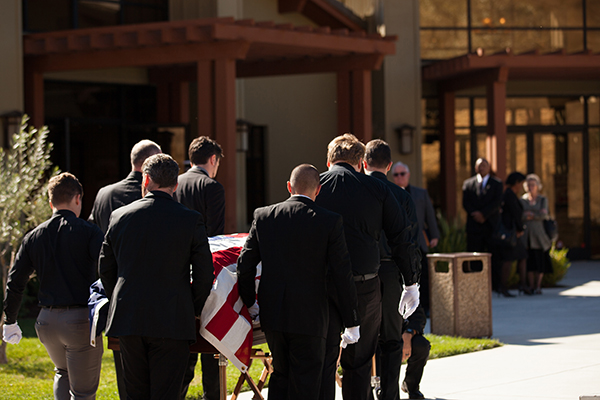Written by Daron Brown
From his column Pressing On
 In our culture clergy are increasingly relegated to the sidelines of the public sphere. During the pandemic, pastors were not even close to the top of the lists of those considered to be essential workers. Anymore, the role of pastors in public life is largely seen as ceremonial. At civic functions our presence is perfunctory. In weddings we are viewed as little more than a prop, alongside the candelabra and hydrangea-laced backdrop.
In our culture clergy are increasingly relegated to the sidelines of the public sphere. During the pandemic, pastors were not even close to the top of the lists of those considered to be essential workers. Anymore, the role of pastors in public life is largely seen as ceremonial. At civic functions our presence is perfunctory. In weddings we are viewed as little more than a prop, alongside the candelabra and hydrangea-laced backdrop.
One exception to the non-essential nature of public pastoral work is officiating at funerals. The funeral may be the last public arena where pastors have an influence. When it comes to funerals, even among the unchurched, clergy are sought, desired, and heard. If you gather a group of pastors and get us talking about meaningful ministry experiences, we talk about funerals. More than other ministry practices, officiating funerals gives us the sense that our ministry makes a difference. Funerals represent some of our most sacred and fruitful work.
During times of loss—especially end-of-life situations—people turn to us for comfort, but they want more. In their time of darkness, they reach for handles to grasp. They long to hear something to help make sense of death. Their concern applies not just to the current loss, but to death in general and, ultimately, their own. The loss of a loved one confronts them personally and powerfully in a way that cannot be ignored. As Paul reminds us, death “stings,” and when that sting strikes, those affected look to ministers for relief.
Because of these factors, funerals provide pastors with a great opportunity for incarnational ministry—to represent Jesus to others. All ministry done in the name of Jesus should be incarnational, but during times of loss people are most receptive. It is a sacred privilege to walk alongside a family during a season of loss, which often precedes and may extend long after the funeral. The experience affords opportunities for us to invest time with the family, pray with them, listen to their stories, and share in their grief. In doing so, our presence bears witness to our very present God.
Second, funerals are ripe occasions for preaching Good News. This does not mean we should become heavy-handed or manipulative, but we can stand before a group of suffering people and articulate what we believe about life and death. Funerals give us an opportunity to expose hollow folk theologies that do more harm than good. Through the framework of a person’s life we speak honestly about loss, suffering, and death. We offer space for grief and lament.
The Bible not only permits but highlights this message. We tell the story of Jesus—God who suffers with us. Who did something about death. Whose Resurrection Life is the new order of things. We declare what we believe about the bodily resurrection of the dead. We announce hope. In the best scenarios, the gospel story is woven into the life of the deceased. In such cases, we simply point out the ways in which their life bore witness to the gospel.
When we preach funerals our primary duty is not to bring comfort. Rather, it is to declare God’s love in His sacrifice for humanity and His victory over death. This is the true message of comfort, and so much more.
Funerals require intentionality. Rituals and liturgies are more than formalities. They bring order to the chaos of death. Funerals are occasions for worship in which the community of faith participates, collectively announcing gospel truth. Whether or not we knew the deceased person, sitting with the family to hear stories and gather information about them before the funeral is time well spent. In the service we celebrate the parts of a person’s life that are worth celebrating. Give permission for people to grieve, laugh, and to embrace their need and weakness. Tell them about the God who, in Christ, suffers alongside of us. We release the church to pray and feed and care for the family, and simply preach the story, the whole story of the gospel. In other words, we present the Good News and give reason to rejoice in the hope we have in Christ.
Pastor, in these times of loss, preach the gospel you preach so many times on Sunday mornings. Preach it clear and preach it well, because—at funerals—people are listening.
Daron Brown lives and pastors in Waverly, Tennessee.
